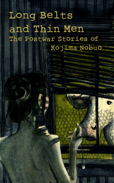Long Belts & Thin Men

|
Long Belts and Thin Men: translated by Lawrence Rogers |
Kojima Nobuo is best-known in English for his outstanding novella, “Amerikan sukuuru” (1954, “The American School”), which earned the Akutagawa Prize that year. Strongly affected by World War II and the postwar era, his style evolved into a powerful, often painfully honest satire depicting the Japanese male as a Milquetoast, under the thumbs of women and society in general. Influenced by Gogol and other giants of Russian literature, Kojima’s style and technique immerse the reader in the doubts and dilemmas of his characters to powerful effect.
Kojima’s award-winning story, “The American School,” depicts the visit of a group of Japanese English-language teachers to an international school for the children of Americans and others living in Japan. The reactions of the educators as they walk four miles to the school and come into contact with transplanted American culture for the first time are both touching and comical; the perfect satire. Many of his stories from this period deal with the irony, pain, and internal turmoil of men who have not come to grips with the society of post-War Japan, or their place within it.
In addition to “The American School,” this volume contains a number of his other important works, illuminating the trials faced by the Japanese following World War II, individually and as a society, through the eyes of a succession of world-weary and ineffectual protagonists.
- The Rifle (小銃)
- The Smile (微笑)
- Voices (声)
- The American School (アメリカン・スクール)
- The Black Flame (黒い炎)
- Buffoon in an Alien Land (異郷の道化師)
- A Certain Day (或る一日)
- The House of the Hooligans (狼藉者のいる家)
- In Our Forties (四十代)
